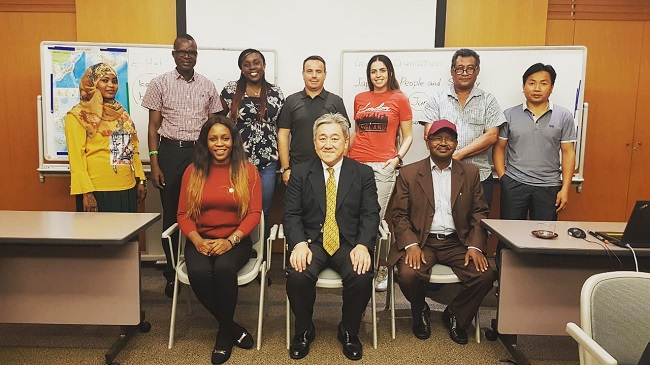Two Nigerians – Adiza Ujo and Adesuwa Obasuyi – are undergoing the Knowledge Co-Creation Programme (KCCP) of the Japan International Cooperation Agency (JICA), which is implemented as part of the Official Development Assistance Programme of the Government of Japan.

The training programme is titled Enhancement of Solid Waste Management Capacity (Advance, Planning and Policy). It began on Monday, October 21 and ends on Saturday, November 16, 2019. The programme aims at strengthening human and institutional capacity for sustainable solid waste management (SWM), especially in the field of raising social awareness, environment education, and promotion of 3Rs (reduce, reuse and recycle).
It is mainly designed for local government and/or regional government who are in charge of solid waste management, central government and governmental agencies which support local and regional government for improvement of solid waste management, and other organizations such as NGOs or public corporations which are engaged in solid waste management at local level.
Ms Ujo is the founder of Stewards of the Environment for Sustainable Change Initiative, also known as Stop Don’t Drop. It is an anti-litter organisation committed to ending the culture of littering, encouraging recycling and providing engagement opportunities in waste management.
Ms Obasuyi is a social development expert in the environment sector who is passionate about and dedicated to the improvement of the state of solid waste management in Nigeria. She holds a Master’s Degree in Environmental Quality Management and currently runs Sustainable African Cities and Communities Initiative through which she works to transform challenges into opportunities, key into the sustainable development agenda and make African cities and communities inclusive, resilient, safe and sustainable.
UN General Assembly adopted “Transforming our world: the 2030 Agenda for Sustainable Development” with the 17 Sustainable Development Goals (SDGs) and 169 targets in 2015. Solid Waste Management is addressed in the related SDGs and targets.
For example, Goal 11 (Sustainable Cities and Communities) articulates, “Make cities and human settlements inclusive, safe, resilient and sustainable.”
Target 11.6 states that “By 2030, reduce the adverse per capita environmental impact of cities, including by paying special attention to air quality and municipal and other waste management.”
Target 12.5 of Goal 12 (Responsible consumption and production) states that “By 2030, substantially reduce waste generation through prevention, reduction, recycling and reuse.”
One of the targets of Goal 14 (Life Below Water), 14.1, states the importance of reducing marine pollution in particular from land-based activities, including marine debris and nutrient pollution.
In Nigeria, with an undeveloped solid waste management system, problems such as illegal dumping, open dumping/burning of untreated waste, and improper treatment of hazardous waste are threatening public health, sanitation, biodiversity and other aspects of development. The increase in population, economic growth, and rural-urban migration in recent years have only worsened the situation.
According to the Waste Management Society of Nigeria (WAMASON), the average Nigerian generates about 500 grams of waste per day which amounts to over 32 million tonnes annually with less than 30% collection rate. The current quantity of waste generated is expected to triple in 2050 and, considering that the urban population of Nigeria is already at 51.9% and expected to increase in the coming years, the magnitude of the problem is likely to grow even larger unless immediate steps are taken.
From information gathered, Japan experienced similar problems and it has come close to achieve a sound material cycle society in recent years and this has been realized through joint efforts of national government, local governments, private companies, associations, and citizens who have worked and played respective roles to optimise collection, transport, recycling, intermediate treatment, final disposal of waste, and more. In the course of these efforts, Japan has also set up extensive systems to promote technological innovation and 3Rs (reduce, reuse and recycle) initiatives while raising social awareness on waste reduction.
This programme provides participants with knowledge on SWM policy instruments, technologies, stakeholder participation based on Japan’s experience through lectures, presentations, exercises, visitations and observations, in collaboration with Japanese local governments in Kansai region.
Topics being covered are: linkages between SWM (Solid Waste Management) and ESD (Education for Sustainable Development), outline of the SWM Plan at national and local government level, social contribution activities by corporations, waste management activities in community, linkage between solid waste and economic activities, issues on waste collection work, natural disasters and waste problem, conservation of sub-urban agricultural land and resource circulation, product life cycle (production to disposal of goods), strengthening capacity of administrative system and office procedure.
Other participants are from Bangladesh, Democratic Republic of Congo, Kosovo, Laos, Lebanon, Papua New Guinea and Sudan.
At the end of the programme, all participants are expected to formulate an action plan concerning measures to build a sound material-cycle society necessary at local, wide-area or national level.
Ujo and Obasuyi are hopeful about implementing their action plans they formulate with the support of the Nigerian government upon their return.
By Adesuwa Obasuyi
